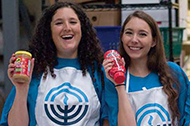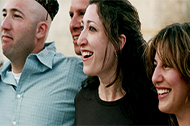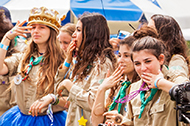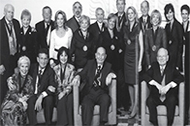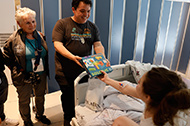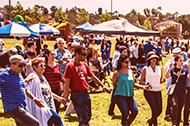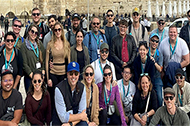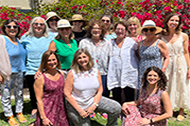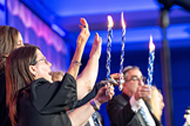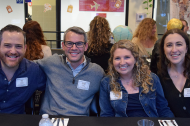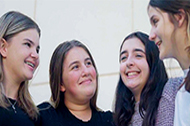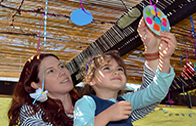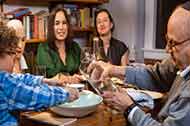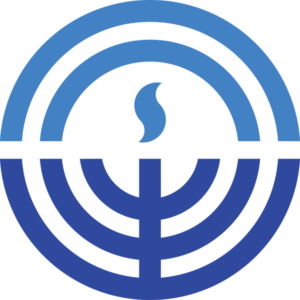Reflections from Day 3 – Alan Viterbi
12/01/2023
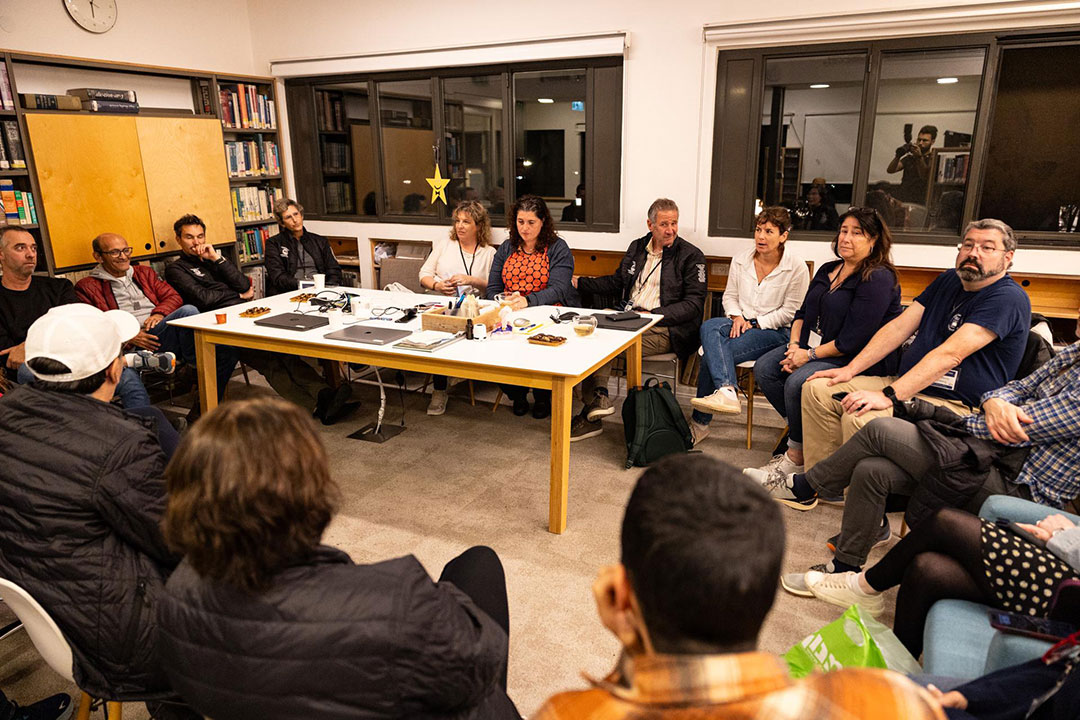

Written by Alan Viterbi on November 29, 2023
Today we visited the “temporary” homes for the Survivors of Kfar Azza and Nachal Oz, a unique therapy facility staffed by hundreds of volunteer psychologists, therapists, musicians and others to assist the Survivors of the Nova music festival, and an unusual visit to an Israeli air force base in the midst of a war. Forgive the length, but I felt the sacred obligation to try to fully document the testimony we heard from the Survivors of the attack.
First stop: Shefayim, where Kibbutz Azza’s Survivors were evacuated to in central Israel
 We sat down in a meeting room at the Kibbutz Shefayim guesthouse which serves as the first temporary home for Kibbutz Kfar Azza. (They are projected to move again at the end of the school year to a second temporary location, somewhere in the south, while their Kibbutz is rebuilt from the devastation we witnessed on Monday.) Before beginning to hear the testimony of the Survivors, our Federation CEO, Heidi Gantwerk, paused to introduce our security guard, Daniel, to the members of Kfar Azza. Daniel is a paratrooper reservist, and was home on 10/7, heard the news of the terrorist attack underway, drove to his base, met some other members of his unit (none of whom had even been called up yet), grabbed their uniforms and weapons and headed south in their personal cars. They headed to Be’eri first, found the army had already arrived there and went to Kfar Azza next, where the army had not yet arrived, and began battling the terrorists and began rescuing people holed up in their mahmads or safe rooms (every home in Israel built since the first Gulf War, when Saddam Hussein fires missiles at Israel is required to have one; they are designed to protect the people in the room from missiles, but none of them have locks on the blast doors, as the idea is for rescuers to clear the rest of a damaged building and then open the door to rescue the occupants). The people from Kfar Azza who were about to speak turned to him and gave him such a heartfelt thank you. As they spoke we understood why.
We sat down in a meeting room at the Kibbutz Shefayim guesthouse which serves as the first temporary home for Kibbutz Kfar Azza. (They are projected to move again at the end of the school year to a second temporary location, somewhere in the south, while their Kibbutz is rebuilt from the devastation we witnessed on Monday.) Before beginning to hear the testimony of the Survivors, our Federation CEO, Heidi Gantwerk, paused to introduce our security guard, Daniel, to the members of Kfar Azza. Daniel is a paratrooper reservist, and was home on 10/7, heard the news of the terrorist attack underway, drove to his base, met some other members of his unit (none of whom had even been called up yet), grabbed their uniforms and weapons and headed south in their personal cars. They headed to Be’eri first, found the army had already arrived there and went to Kfar Azza next, where the army had not yet arrived, and began battling the terrorists and began rescuing people holed up in their mahmads or safe rooms (every home in Israel built since the first Gulf War, when Saddam Hussein fires missiles at Israel is required to have one; they are designed to protect the people in the room from missiles, but none of them have locks on the blast doors, as the idea is for rescuers to clear the rest of a damaged building and then open the door to rescue the occupants). The people from Kfar Azza who were about to speak turned to him and gave him such a heartfelt thank you. As they spoke we understood why.
Rotem (44 years old), a lifelong resident of Kfar Azza spoke first. She began with, “we had the loveliest place on earth.” On 10/7 the kibbutz was supposed to hold its annual kite festival that Kfar Azza has been staging for fifty years. Residents build their own kites, decorating them with messages of peace and hope. The event never happened. Rotem is a single mother, and her son (age 7) and daughter (age 5) sleep in the mahmad. When the rockets began falling, the children didn’t wake up. Rotem woke and shortly after began hearing shooting inside the kibbutz. She closed the house up, locked the front door, grabbed food and went into the mahmad. She began seeing on the Kibbutz WhatsApp group from other residents that terrorists were everywhere shooting and setting houses on fire. A neighbor, Ofer, wrote her that he had been shot. This was his last message; he died. Then she heard Arabic being spoken by men in her house; she had wanted to hear Hebrew, signifying the army had arrived. She held the handle to prevent the terrorists from opening the door. They were able to force the door partially open and one shot came in. She let go of the door, and before her were six terrorists. Her son asked her if they would now apologize. One terrorist came into the mahmad with them and the rest took up positions around the house. They took her phone and ordered her to unlock it, speaking in English. She intentionally misdialed the code, so they took it from her and gave it to her son and asked him to open it. He did. The terrorist then took her car keys and made her walk to the nearby parking lot to identify her car for them. When she returned to the house, the terrorists were sitting on her couch and eating her snacks. They searched throughout the house and found her IDF reservist ID and asked for her weapon. She didn’t have one. They searched the house, confirming she didn’t have a weapon. They did find a photograph of her kids’ father and ask where he is. He was in Tel Aviv. They ask her where the soldiers are. After two hours they order her back into the Mahmad and close the door, leaving her house. She then heard sounds of battle, but she no longer had her phone and had no idea what was happening. After the sun set, terrorists again reenter the house, but she doesn’t open the mahmad door. Her children go bathroom in their beds and have nothing to drink all night and the next morning. At Noon on Sunday (10/8), the IDF arrives at her house, but a fierce firefight breaks out, with the terrorists firing at the soldiers from the house next door. After these terrorists are killed, the army evacuates her. At the evacuation point, a nearby gas station, she sees her parents who also live elsewhere on the kibbutz. Only then she realizes what happened – with so many neighbors killed and taken hostage. She was waiting to hear what had happened to her brother and his family, who also lived on the kibbutz, a common practice on kibbutz’s. She found out they too survived. Most people who survived had held the mahmad door for hours. She had a miracle, but she explained that her neighbors didn’t have a miracle. Her kids ask about their friends, and their friends’ parents. So many were killed. Fortunately the kids from Kfar Azza who were taken hostage have been returned, but they are still waiting for so many of the adult hostages to come back. She spoke about the drawing her son made the first day sitting with a therapist, in which he drew them in the mahmad, with the door open and the terrorists standing there. She said she is sitting here and doesn’t know what will be next for them.
Omer spoke next. He and his wife have two children. His son is 12, and his daughter is 8. They were all home the morning of 10/7. When the rocket barrage began, he, his wife and son went into the Mahmad, which was his daughter’s bedroom. When the barrage stopped briefly, he went outside to see what was happening and heard shooting everywhere. He locked the house and they went into the mahmad and began texting neighbors. It was already a hot day early in the morning, but he turned off the lights and AC, and hid the children under bed “like in the holocaust”. They stayed in the mahmad for over twenty hours. They could hear the terrorists. His son was texting friends and began screaming that Ofir Libstein was dead. And then friends texted him that their house was on fire. Omer couldn’t find anything to secure the handle of the Mahmad door. He found the kite materials for the festival and grabbed the rope to try to secure the door. Terrorists proceeded through houses on the street. He received a message from a neighbor with a baby and he said they were trying to open the door to their mahmad. He held the handle for three hours. They lost cell service early on, so they could just communicate via WhatsApp over the WiFi. Then they lost power. After three hours, the IDF arrived and they could hear a pitched battle for thirty minutes outside their house. The power came back on and he learned his neighbors with the baby had been rescued. It was 6 pm and they hadn’t eaten or drunken anything. When they could get food, they didn’t eat any of it until the next day. He heard Hebrew spoken outside and opened the window. A gun battle resumed outside house. Terrorists were all over his street. Circa 300 terrorists had entered into the kibbutz he later learned to slaughter them with rocket propelled grenades and machine guns. Over 60 people died in Kfar Azza. At 2 am the IDF came back and said they had 5 minutes to grab things and then evacuated them. At evacuation point they began to see the rescued neighbors and they kept asking about missing neighbors. He has had to tell his 8 year old that her friends was kidnapped to Gaza. He had to tell her that her teacher was killed. “You couldn’t even imagine what we saw. We were a peaceful community and wanted peace with our neighbors. He saw how their neighbors were killed and raped and mutilated. He has watched the videos of the people In Gaza celebrating and stomping on bodies of Israelis taken. Once upon a time, he saw them as people but now he has lost all compassion.
Eleanor woke up at 6:30. She has three teenage children. Her oldest daughter is one week from reporting for reserve duty. Her husband could hear the yells of Allu akhbar and heard the terrorists shooting. They grabbed three kitchen knives and retreated into the mahmad. Then they heard terrorists on the roof of their house, as well as that of the neighbors. Over the course of the day and night, she had to go bathroom in a trash can. They received horrible WhatsApp messages all day from neighbors. Some neighbors waned that the terrorists had taken phones and were using the kibbutz WhatsApp group to identify where residents were. Once they realized it, they kept creating new groups all night until they felt they had a secure one. One neighbor texted them that the terrorists were claiming that they were from the IDF to get them to open the door. Eventually the IDF arrived and she was able to confirm that they were really IDF by asking them which scout troop they had belonged to growing up. They came out of the mahmad. Severn minutes later the soldiers told them to go back in the safe room because they needed to clear the area. It took another six hours because there were so many terrorists. They finally walked out at 2:30 am. Their 65 year old neighbors, who were grandparents, were murdered and they heard it. They had to walk to the evacuation point with active fighting still around them. The soldiers told them not to look to their right or left as there were bodies everywhere.
Even when they got out, buses were unsafe so army took them on trucks. At some point they made them dismount as they needed to go ahead and fight off more terrorists on the road. They didn’t get to the nearby city of Netivot until 6:30 am, 24 hours after it started. Until they got to their temporary home in Shefayim, they didn’t realize what had happened and how many friends and neighbors had died. Eleanor joined the funeral planning team once she was at Shefayim, which painfully kept her very busy. She is a child of holocaust Survivors, and the whole time kept thinking she was reliving her parents’ experience. All of the family is now in therapy. The therapists told them they have no experience with events like this, and they don’t have case studies to guide them. The hardest thing is telling the children that multiple friends were murdered. Someone asked her how long they would be in thereby. Eleanor answered, “for a lifetime.“ She told us that her husband had always opposed the teenagers getting tattoos. Now, many of the kids have tattooed on their arms the names of friends who were murdered. The teenagers recently baked cupcakes to commemorate a dead friend’s birthday and took them to a hospital in Tel Aviv where the dead friend had been born to give to them to patients.
We were then joined by Victor, who is not a member of the kibbutz. His wife was born there and her parents live there and survived. They and other former kibbutz members and relatives began organizing to help the kibbutz because the government wasn’t helping. They have begun raising money to support the community. He said Kfar Azza has a long journey ahead of them. They will be at Kibbutz Shefayim for at least six months and then another interim place for 18 months. They are working to keep the community together and cohesive. About half the residents are here in Shefayim. Many others are nearby. The first priority is psychological counseling, and they know it will become harder to access mental healthcare when they return south, where there are less resources to begin with, and everyone down there needs it. They are focused next on the educational needs of the children, including intensive trauma counseling. Most families lost their cars in the attack, although the Mitsubishi importer in Israel had donated 30 cars each to the kibbutz’s which were devastated. Many kibbutz members worked in the kibbutz businesses and served clients in the area, and now have no work. There are lots of challenges and they still have no idea what assistance will come from the state. They are depending on chamals formed to assist the refugees. “We are going back and we are going to rebuild Kfar Azza. We are not asking the members now what they will do. Our plan is to build Kfar Azza better than it was and then invite people to return if they are ready. “
 We visited the makeshift educational facility. The program already has therapy fully integrated into it. Then we visited the “store” for people to get donated clothes etc., as they left with nothing. When we entered, I saw the Doron’s mother working as a volunteer in the store, she was the woman whose daughter had been taken hostage and who we met in our visit to Kfar Azza on Monday. I sat next to her, and told her we were telling others her daughter’s story as she had requested. She replied that she looks every day at the list of who is to be released that night from Gaza and each day she doesn’t see her daughter’s name.
We visited the makeshift educational facility. The program already has therapy fully integrated into it. Then we visited the “store” for people to get donated clothes etc., as they left with nothing. When we entered, I saw the Doron’s mother working as a volunteer in the store, she was the woman whose daughter had been taken hostage and who we met in our visit to Kfar Azza on Monday. I sat next to her, and told her we were telling others her daughter’s story as she had requested. She replied that she looks every day at the list of who is to be released that night from Gaza and each day she doesn’t see her daughter’s name.
At lunch we met one of the founders of a surf therapy program which has 11,000 alumni, and significant data on how this can change the trajectory for troubled and/or traumatized youth. He bumped into us, saw our San Diego jackets and wanted to thank us. The San Diego Jewish Federation has funded this non-profit to work with each of the Sha’ar HaNegev kibbutz’s. Here the Kfar Azza program had 80 participants.
Before leaving Shefayim, we met with Access Israel, an advocacy group seeking to make the country more accessible for people with physical challenges. After 10/7 they shifted toward helping hundreds of families which included someone with disabilities to relocate to an appropriate housing setting, and help them with any equipment that they need. Again, the San Diego Jewish Federation provided funding for this program.
Second stop: Merhav Marpe
 This is a unique, highly innovative retreat established immediately after 10/7 to create a new mental health paradigm to treat Survivors of the Nova music festival, where hundreds of young people at an all night event were murdered and many taken into Gaza as hostages. Gila, a McKinsey partner who recently left the consulting firm to figure out what she wanted to do next, stepped in and became the executive of this emerging day retreat center. (I realized she was a former colleague and a friend of my son-in-law’s Dad – small world we live in.) They use a variety of therapy techniques to engage these young victims and enable them to begin talk therapy. Gila described it as building a plane as it was already flying as they learned how to provide care for their guests. They use massage therapy, sound therapy, reflexology, acupuncture, lots of home-cooked food, singing, pets, anything to engage people. As guests arrive, they don’t ask them what services they want, they let them come in and learn what is available and what speaks to them. They recognize that their clients had a total loss of agency at the music festival massacre that morning, and they want to begin by giving them back control. Theyb have even brought in rabbis. We saw guitar and drum playing Chabad rabbis to hang out with them, as they learned that many of these young people felt that God was punishing them for having done something wrong, which the rabbis explain is not the case. Next week, they are bringing in the police forensics unit which has been working nonstop to identify the bodies to try an innovative way to engage them in therapy, as they are a group that doesn’t see themselves as needing it. All of the services are free, everyone who works there, including hundreds of therapists are all volunteers. They believe that this approach can take away the stigma of therapy for trauma victims.
This is a unique, highly innovative retreat established immediately after 10/7 to create a new mental health paradigm to treat Survivors of the Nova music festival, where hundreds of young people at an all night event were murdered and many taken into Gaza as hostages. Gila, a McKinsey partner who recently left the consulting firm to figure out what she wanted to do next, stepped in and became the executive of this emerging day retreat center. (I realized she was a former colleague and a friend of my son-in-law’s Dad – small world we live in.) They use a variety of therapy techniques to engage these young victims and enable them to begin talk therapy. Gila described it as building a plane as it was already flying as they learned how to provide care for their guests. They use massage therapy, sound therapy, reflexology, acupuncture, lots of home-cooked food, singing, pets, anything to engage people. As guests arrive, they don’t ask them what services they want, they let them come in and learn what is available and what speaks to them. They recognize that their clients had a total loss of agency at the music festival massacre that morning, and they want to begin by giving them back control. Theyb have even brought in rabbis. We saw guitar and drum playing Chabad rabbis to hang out with them, as they learned that many of these young people felt that God was punishing them for having done something wrong, which the rabbis explain is not the case. Next week, they are bringing in the police forensics unit which has been working nonstop to identify the bodies to try an innovative way to engage them in therapy, as they are a group that doesn’t see themselves as needing it. All of the services are free, everyone who works there, including hundreds of therapists are all volunteers. They believe that this approach can take away the stigma of therapy for trauma victims.
Third stop: Nachal Oz
Yael (someone many of us know, who managed the Sha’ar HaNegev partnership with San Diego for five years, until five years ago, met us at their temporary home. 14 people died in this small kibbutz. 7 people were kidnapped, including two visitors (the Americans who were released early on). 3 have since been released, but two fathers are still in the Gaza Strip. She highlighted that no one talks about the fathers being released yet. Yael said “It’s going to take a long time to recover. I don’t know how we will ever recover. We cannot even remember everything that happened that day. I know San Diego has been with us for over 25 years, and I know you will be with us through this.” She added, “there is a lot we will learn from this experience. We will have much to teach the world. You have to move forward.” Yael then introduced three Survivors to speak with us.
 Naomi, who was born in the US, spoke first. She began, “I’m Naomi and I’m a refugee. And that’s really hard to say”. She moved to Israel as a child with her family, and moved to Nachal Oz six years ago. She has three boys; the oldest is 7. She is the kibbutz nurse and knows everyone. They moved into a newly built house on the kibbutz at the beginning of the new year. The new house was overlooking the back gate and fields, adjacent to Gaza. They had been practicing a play which included all the members of the kibbutz, in honor of the 70th anniversary of the founding of the kibbutz. The celebration was scheduled for 10/7. She woke up a little before 6:30 to the loudest noise she ever heard. She and her husband ran into the mahmad where the three boys slept. The missile and rocket attack went on for 10 minutes. She needed fresh air after that and stepped out. She glanced at the fields and saw pick up trucks in the field and saw them driving toward the next kibbutz. At that moment, she received a message to lock the doors and get into the mahmad. Terrorists came to the front door and sprayed it with machine gun fire which permanently jammed their lock closed. They were the first house to be attacked. They destroyed the three houses next to theirs. The gunfire lasted for hours and hours and hours. WhatsApp messages constantly came from other kibbutz members. The power went out for twelve hours. It was the darkest room she has ever been in. All they could hear was gunfire and Arabic screaming. A box for the boys’ toys was their toilet for an entire day. Their youngest is not yet potty trained and they had no diapers. At noon, cell service dropped so they had no communication. As hours progressed, they kept wondering where the army was. Power came back on at 7 pm. They had no idea of the scope of what was happening. It took six more hours until the IDF got them out. 15 soldiers in full gear came to their house. They had 3 minutes to pack what they could, and were taken out the back entrance to a jeep. She saw their cars destroyed. The kibbutz was a war zone. She said she they need a new lexicon to describe what happened. At 2:15 am they left on the bus from the evacuation point. As they left the kibbutz she saw everything and had no idea what happened. While in the Mahmad, when power came back on she didn’t check the news because she couldn’t let that interrupt her being a Mom. All three kids were shoeless when they left the house because her husband packed them up. She only realized the murdering and kidnapping that had taken place when they got to the army base. “10/7 was to the worst evil in the world. After 10/7 we have been exposed to the greatest good in the world (from all the volunteers). But our government has been nowhere.” She said she was so grateful for Am Yisrael Chai. “I very much want to go home and be able to raise my children there. My children want to go home.”
Naomi, who was born in the US, spoke first. She began, “I’m Naomi and I’m a refugee. And that’s really hard to say”. She moved to Israel as a child with her family, and moved to Nachal Oz six years ago. She has three boys; the oldest is 7. She is the kibbutz nurse and knows everyone. They moved into a newly built house on the kibbutz at the beginning of the new year. The new house was overlooking the back gate and fields, adjacent to Gaza. They had been practicing a play which included all the members of the kibbutz, in honor of the 70th anniversary of the founding of the kibbutz. The celebration was scheduled for 10/7. She woke up a little before 6:30 to the loudest noise she ever heard. She and her husband ran into the mahmad where the three boys slept. The missile and rocket attack went on for 10 minutes. She needed fresh air after that and stepped out. She glanced at the fields and saw pick up trucks in the field and saw them driving toward the next kibbutz. At that moment, she received a message to lock the doors and get into the mahmad. Terrorists came to the front door and sprayed it with machine gun fire which permanently jammed their lock closed. They were the first house to be attacked. They destroyed the three houses next to theirs. The gunfire lasted for hours and hours and hours. WhatsApp messages constantly came from other kibbutz members. The power went out for twelve hours. It was the darkest room she has ever been in. All they could hear was gunfire and Arabic screaming. A box for the boys’ toys was their toilet for an entire day. Their youngest is not yet potty trained and they had no diapers. At noon, cell service dropped so they had no communication. As hours progressed, they kept wondering where the army was. Power came back on at 7 pm. They had no idea of the scope of what was happening. It took six more hours until the IDF got them out. 15 soldiers in full gear came to their house. They had 3 minutes to pack what they could, and were taken out the back entrance to a jeep. She saw their cars destroyed. The kibbutz was a war zone. She said she they need a new lexicon to describe what happened. At 2:15 am they left on the bus from the evacuation point. As they left the kibbutz she saw everything and had no idea what happened. While in the Mahmad, when power came back on she didn’t check the news because she couldn’t let that interrupt her being a Mom. All three kids were shoeless when they left the house because her husband packed them up. She only realized the murdering and kidnapping that had taken place when they got to the army base. “10/7 was to the worst evil in the world. After 10/7 we have been exposed to the greatest good in the world (from all the volunteers). But our government has been nowhere.” She said she was so grateful for Am Yisrael Chai. “I very much want to go home and be able to raise my children there. My children want to go home.”
Nadav (34 years old), married to Rotem. His husband had recently taken the volunteer job of head of the security team for the kibbutz 1.5 months before 10/7. He had moved to the kibbutz because during the 2014 battle with Hamas he had served in that area for a month. He was injured during that period and decided to move there to Nachal Oz. His dog was with him in the safe room and never made a sound the whole day (just like Naomi’s kids). He said that Hamas violated his most sacred place on earth. He returned two weeks after they were rescued to see the house. A direct missile had hit his house. He feels his mission is to regain that feeling of the home being his sacred place. He and his husband plan to return and rebuild the house. His siblings and parents are all alive, living scattered across the various communities of the Gaza envelope, but he lost family of family and friends. “It was heartbreaking. It’s up to us to do something different.” He was a 6th grade teacher before the war. He would spend the day trying to make better human beings. He just doesn’t understand how someone elsewhere can instead want to make themselves evil. He keeps telling himself he needs to remain committed to his morals and worldview. It brings him a lot of comfort that we came from far away to be here and hear his story. He ended by saying, “I never planned to be homeless in my life.”
 Danny has lived for fifty years on the kibbutz. He has 2 children, one is a member of the kibbutz and he has grandchildren. His daughter doesn’t love on the kibbutz because of PTSD from the constant bombardments and wars. She lives in Netavim. His adjacent neighbors were attacked. He has no idea why his house was spared. He had no contact with his son and grandkids all day. His daughter in law had gone to Beersheva very early that morning and was on the way back and she saw bodies on the ground outside the kibbutz. She called Danny, as she couldn’t reach her husband. He told her to drive away as fast as possible to his daughter’s home in Netivot. He finally was able to text his son and his son replied 45 minutes later that he and his kids were okay and afraid. He didn’t know anything more about his son’s fate until the IDF rescued them. At 9 pm they received a message to be ready but not to exit until the IDF arrived. When the soldiers arrived, his wife refused to go anywhere except to guide the soldiers 450 meters across the kibbutz to rescue her son and grandchildren. When they got there, they found them alive.
Danny has lived for fifty years on the kibbutz. He has 2 children, one is a member of the kibbutz and he has grandchildren. His daughter doesn’t love on the kibbutz because of PTSD from the constant bombardments and wars. She lives in Netavim. His adjacent neighbors were attacked. He has no idea why his house was spared. He had no contact with his son and grandkids all day. His daughter in law had gone to Beersheva very early that morning and was on the way back and she saw bodies on the ground outside the kibbutz. She called Danny, as she couldn’t reach her husband. He told her to drive away as fast as possible to his daughter’s home in Netivot. He finally was able to text his son and his son replied 45 minutes later that he and his kids were okay and afraid. He didn’t know anything more about his son’s fate until the IDF rescued them. At 9 pm they received a message to be ready but not to exit until the IDF arrived. When the soldiers arrived, his wife refused to go anywhere except to guide the soldiers 450 meters across the kibbutz to rescue her son and grandchildren. When they got there, they found them alive.
We ended the evening at Israel’s northern most air force base. We received a briefing from a squadron commander, and then the rabbis in our group served dinner to the pilots and crew members and the rest of us.
One thing that is very clear, the emergency funds which San Diego has raised for Sha’ar HaNegev have already been of great benefit to the people of these kibbutz’s, but the needs are enormous and this will not be a one time raise to assist them. On the bus, we began to discuss the need to create a sort of Marshall Plan for Sha’ar HaNegev to help them build back their communities after the war is over. And we need to double down on the people-to-people programs which have created our deep connections to these special communities, and which means so much to them in this devastating time for them. We mused that the annual campaign will need to involve to incorporate the funding to address these two significant needs.
Am Yisrael Chai!
